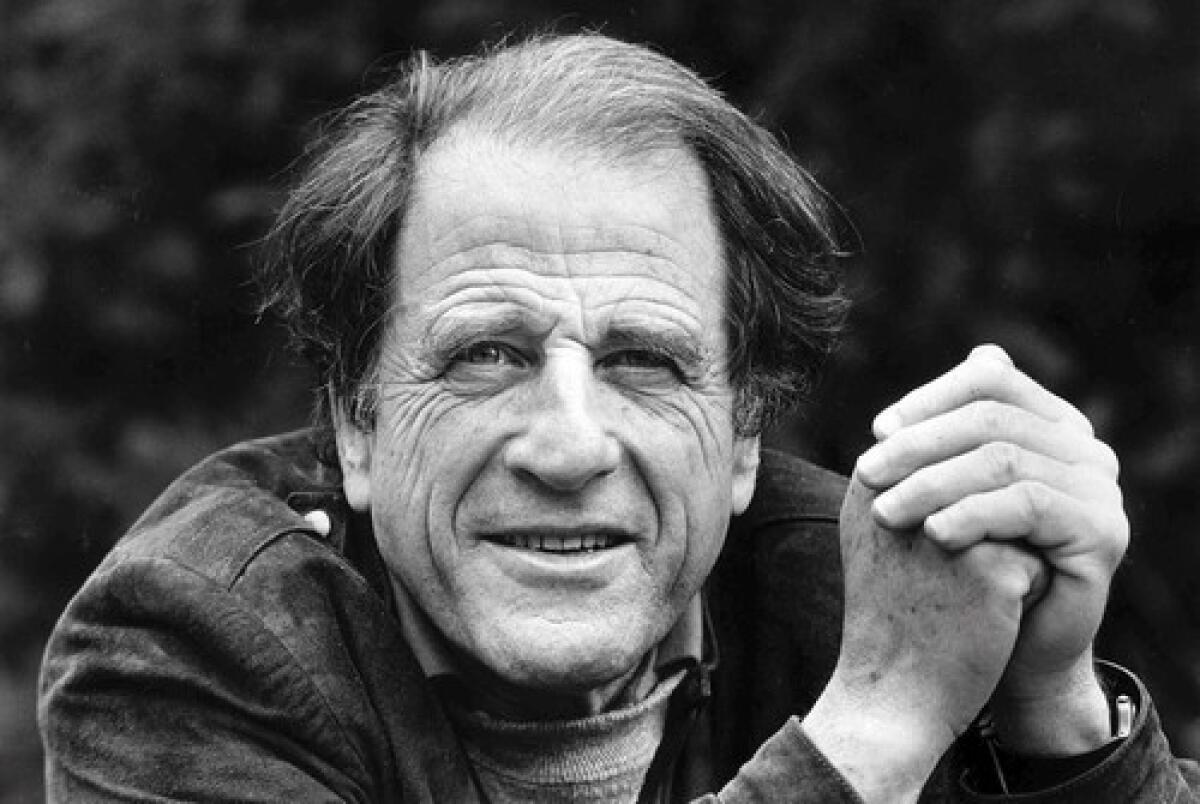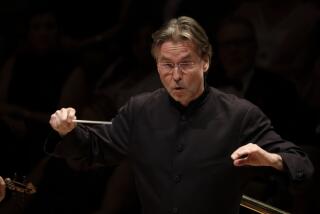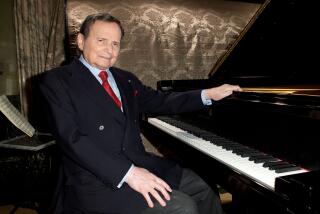Lukas Foss, versatile and prolific American composer, dies at 86

Lukas Foss, the polyglot American composer, conductor and pianist who directed half a dozen Ojai Music Festivals, led marathon concerts at the Hollywood Bowl and succeeded Arnold Schoenberg as head of composition at UCLA, has died. He was 86.
Foss died Sunday at his home in New York, according to his wife, Cornelia Foss. No cause of death was given, but Foss was known to have had Parkinson’s disease.
American composer Aaron Copland once called Foss’ works “among the most original and stimulating compositions in American music.”
Foss wrote more than 100 works, passing through three stylistic periods, from tonal, neoclassical writing through experimentation with 12-tone, electronic, chance and other techniques, then returning to complex but more listener-friendly works.
His output includes four symphonies, three string quartets and many choral, chamber, orchestral and stage pieces, embodying almost every style available to a classical composer.
His best-known works are “Time Cycle” (songs with orchestra after texts by W. H. Auden, A. E. Housman, Franz Kafka and Friedrich Nietzsche); “Baroque Variations” for orchestra (deconstruction of Bach, Handel and D. Scarlatti); “Echoi” (for four instruments); two operas, “The Jumping Frog of Calaveras County” (after Mark Twain) and “Griffelkin”; Symphony No. 3 (“Symphony of Sorrows); and “Renaissance Concerto” for flute and orchestra.
“The funny thing is that after all these works, I still don’t have a recipe for composing,” Foss told the New York Times in 1997.
“I always wonder where the notes are going to come from, and I still beat my head against the wall, as I’m doing now with the string quartet I’ve just started. It’s always a kind of torture at first, until suddenly the door opens, and you get ideas, and you know what you want to do and how you want to do it. Then it’s a piece of cake, but until it happens it’s quite difficult.”
Foss and his impressive portfolio were often overshadowed by his friend and colleague Leonard Bernstein.
“People would always talk about Lukas in relationship to Lenny, and that made people overlook what he was and is, which is a much more disciplined composer,” composer William Bolcom told the Detroit Free Press in 2000.
“Lukas has been almost cursed by his ability to do so many different things so well,” Bolcom said.
The son of a philosophy professor and a painter, Foss was born Lukas Fuchs in Berlin in 1922. His birth date is usually given as Aug. 15, but the composer wasn’t so sure.
“I have no birth certificate,” he told the New York Times in 1997. “I have a passport, but the birth date on it was the result of guesswork.”
Foss’ family fled the Nazis when he was a teenager. He studied music at the Lycee Pasteur in Paris from 1932 to ’37 and then at the Curtis Institute of Music in Philadelphia from ’37 to ‘39, studying piano with Isabelle Vengerova, who also taught Bernstein; conducting with Fritz Reiner; and composing with Rosario Scalero and Randall Thompson.
In addition to Bernstein, Foss’ classmates included composers Samuel Barber and Gian Carlo Menotti. Foss was also part of the first class of pre-professional students at what was then Berkshire Music Center.
Although he began composing at 7, Foss’ first major success came at 22 with “The Prairie,” a cantata based on Carl Sandburg’s poem, which won the 1944 New York Music Critics’ Circle Award. The piece was heavily influenced by the populist style of Copland.
“I had fallen in love with America because of people like Aaron,” said Foss, who became a U.S. citizen in 1942.
Foss succeeded Schoenberg at UCLA in 1953 and taught there for 10 years. He also led the Ojai Music Festivals from 1961 to 1964, ’79 to ’80 and again in ’81.
At Ojai, which underwent a number of financial difficulties, Foss was known as “a stylistic eclectic . . . a genial podium personality, a knowing technician, an imaginative program-builder and a facile pianist,” according to former Los Angeles Times music critic Martin Bernheimer.
Foss conducted 12 marathon concerts at the Hollywood Bowl, each devoted to the works of one composer or one theme. The idea behind the six-hour concerts without intermissions was to attract younger audiences who were free to wander in and out as they liked.
“Each time, we drew a great number of young people,” he told the L.A. Times in 1996. “They were actually theme concerts years before theme concerts became normal programming devices, and they were designed for the informal entrance and exit of the listeners, for an atmosphere of looseness.”
He also served as music director or conductor for the Buffalo Philharmonic, the Brooklyn Philharmonic, the Jerusalem Symphony and the Milwaukee Symphony.
Foss was a two-time Guggenheim fellow (1945 and 1960) and won the Rome Prize in 1950 and an American Society for Composers, Authors and Publishers award for adventurous programming in 1979. He held more than 20 honorary degrees.
He was often criticized for picking up on compositional trends rather than initiating them.
“What some people don’t notice when they call me trendy is that I got there after the trend, and usually out of simple curiosity,” he told the L.A. Times in 1987. “Like Ives, who usually got there too early, I did nothing at the right time. I usually got there too late.”
In a 2002 Boston Herald interview, Foss elaborated on his composing style:
“Twenty years ago we had this club, the avant garde, and that’s no longer really very functional. Now any style is OK. Minimal, aleatoric, 12-tone, these are all just techniques. I use them all -- the more the merrier, the richer your vocabulary. It’s wrong to think style is personality. If somebody says, ‘I’m a 12-tone composer,’ it’s like Bach saying, ‘I’m a fugue composer.’ ”
As for the future, “I hope justice will prevail and that my music will get its fair share of performances when I’m gone,” Foss told the Miami Herald in 2001. “I think much of it is very good, very important.”
Foss is survived by his wife, painter Cornelia Brendel Foss, whom he met in 1949 as a student at the American Academy in Rome; a son, Christopher, and a daughter, Eliza Foss, both of New York; a brother, Oliver, who lives near Paris; and three granddaughters, Olivia, Sabina and Eugenia.
Pasles is a freelance writer.
More to Read
Start your day right
Sign up for Essential California for the L.A. Times biggest news, features and recommendations in your inbox six days a week.
You may occasionally receive promotional content from the Los Angeles Times.






